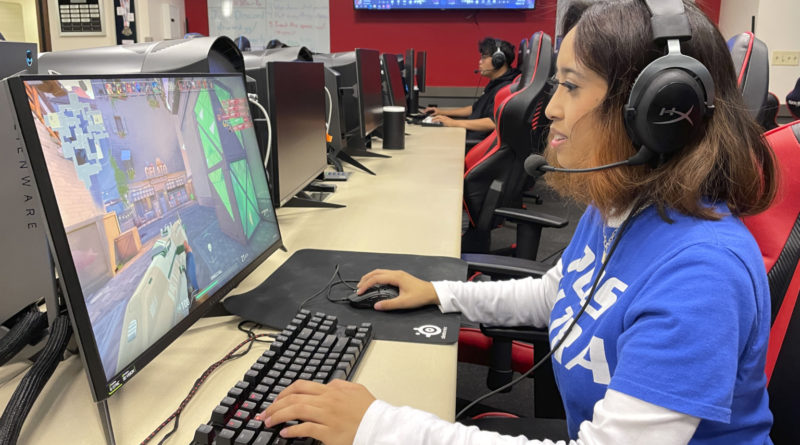Esports Pathway to Careers
How schools and businesses are using multiplayer competitive video games to prepare students for careers in science, technology, engineering and math. Esports Pathway to Careers
As a kid, Kevin Fair would take apart his Nintendo console, troubleshoot issues and put it back together again — experiences the Black entrepreneur says represented “a life trajectory changing moment” when he realized the entertainment system was more than a toy.
“I think I was just genuinely inspired by digital technology,” he said.
Motivated by his love for video games, Fair learned to code and fix computers. In 2009, he started I Play Games!, a Chicago-based business that exposes young people of color to a side of video gaming they might not have otherwise known existed.
By channeling students’ enthusiasm for esports — multiplayer competitive video games — schools and businesses like Fair’s aim to prepare them for careers in science, technology, engineering and math, or STEM, at a time when the fields lack racial diversity.
“These kids were born with digital devices within their hands, and if you give them access, the world is theirs,” said entrepreneur and scholar Jihan Johnston, who founded digital education company Beatbotics with her teenage son, Davon — an avid gamer.
Industry Inequality
Despite industry inequality and representation issues, young video game users are diverse. A 2015 Pew Research Center study found Black teens are slightly more likely than their peers to play video games, while roughly the same amount of white and Hispanic teens play.
Meanwhile, Black and Hispanic workers make up just 9% and 8% of STEM employees in the U.S. respectively, Pew said last year.
Johnston is reframing the conversation about video games by coaching communities of color on how esports can lead to careers for their children.
“I think our community does not know that this can lead to college,” she said.
This school year, DePaul University in Chicago offered a new academic esports scholarship designed to hone practical skills for the video game industry. Nine of the 10 freshmen recipients are students of color, according to Stephen Wilke, the school’s esports coordinator.
Aramis Reyes, an 18-year-old computer science major with a focus in game design and development, is one of the $1,500 scholarship awardees.
The bespectacled teen described himself as a casual, noncompetitive gamer. For Reyes, the magic of video games is the potential for storytelling. “I have so many design ideas that I want to get into,” he said.
Naturally Developed Skills
Skills that gamers develop naturally help prime them for their pick of careers in IT, coding, statistics, software engineering and more, Fair said. Typing proficiency sets up gamers to be efficient in the modern workplace, and competitive players approach the data they see on their screen analytically, thinking in frames per second.
“All of that is high-end math happening in the person’s head at the moment,” he said.
“I think our community does not know that this can lead to college,” she said.
This school year, DePaul University in Chicago offered a new academic esports scholarship designed to hone practical skills for the video game industry. Nine of the 10 freshmen recipients are students of color, according to Stephen Wilke, the school’s esports coordinator.
Aramis Reyes, an 18-year-old computer science major with a focus in game design and development, is one of the $1,500 scholarship awardees.
The bespectacled teen described himself as a casual, noncompetitive gamer. For Reyes, the magic of video games is the potential for storytelling. “I have so many design ideas that I want to get into,” he said.
Skills that gamers develop naturally help prime them for their pick of careers. IT, coding, statistics, software engineering and more. Typing proficiency sets up gamers to be efficient in the modern workplace. Competitive players approach the data they see on their screen analytically, thinking in frames per second.
“All of that is high-end math happening in the person’s head at the moment,” he said.
Rosete, 20, is majoring in user design experience to combine her creativity and coding skills.
Awareness
She’s aware of inequality issues in STEM and video game design. Mentioning Activision’s Blizzard Entertainment president, ousted after a discrimination and sexual harassment lawsuit cited a “frat boy” culture that became “a breeding ground for harassment and discrimination against women.”
But Rosete said DePaul doesn’t feel that way. “We’re all just here to learn,” she said.
When first-person shooter game Valorant released a new Filipina character, Rosete said she started screaming and running around in excitement.
“I felt at peace,” said Rosete, who is Filipina American. “I felt like my representation had come.”
But video games are not a cure-all for the STEM diversity gap. “It’s a systemic problem that’s way bigger than esports,” Wilke said.
Lack of representation, online extremism and expensive equipment buy-in could have the opposite effect by reinforcing stereotypes and exacerbating inequality.
Online safety is also a concern. Video game company Epic Games, maker of Fortnite, will pay a total of $520 million to settle complaints.
U.S. federal regulators said, involving children’s privacy and methods that tricked players into making purchases,
Parents Recommendation
Fair recommended parents keep a “good watchful eye” on their kids’ online activity. “There’s a lot of trash out there,” he said.
Access to gaming consoles and computers varies by teens’ household income. The average Black and Hispanic households earn about half the average household, the Federal Reserve reported in 2021.
Although surveys show increases in developers of color, white men remain overrepresented in the gaming industry.
Fair said there is a long way to go to improving racial diversity in both STEM and esports. “I can have a lot of kids that love playing FIFA. But that doesn’t mean that they’re going to desire to become engineers,” he said. “You have to show directly how what they’re doing, connects to something that they can make money in.”
Source: Esports Pathway to Careers
https://www.techedmagazine.com/category/news/stem/

